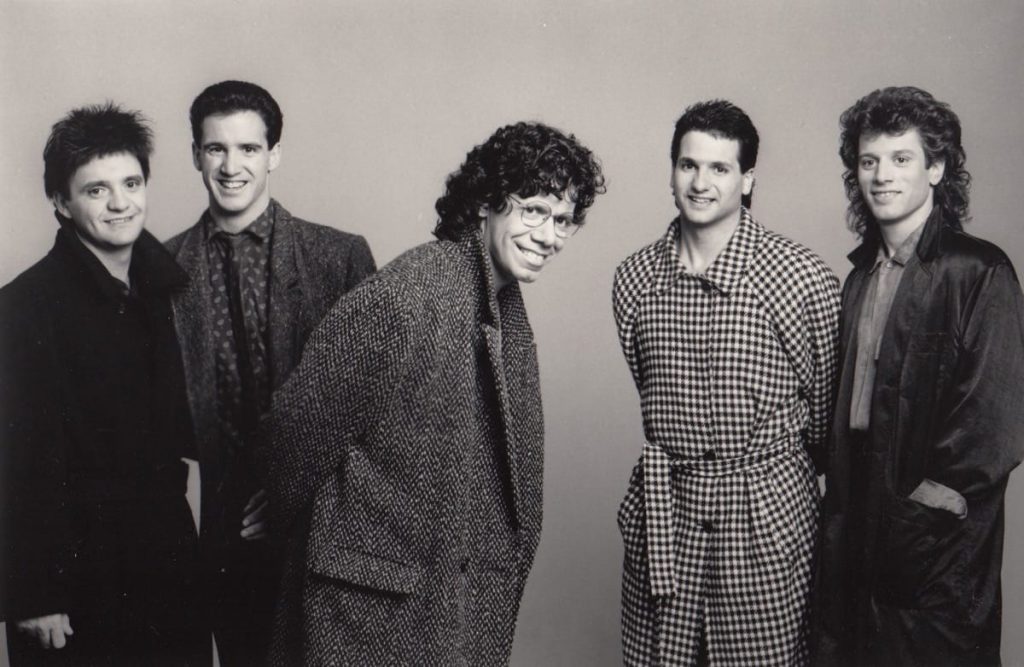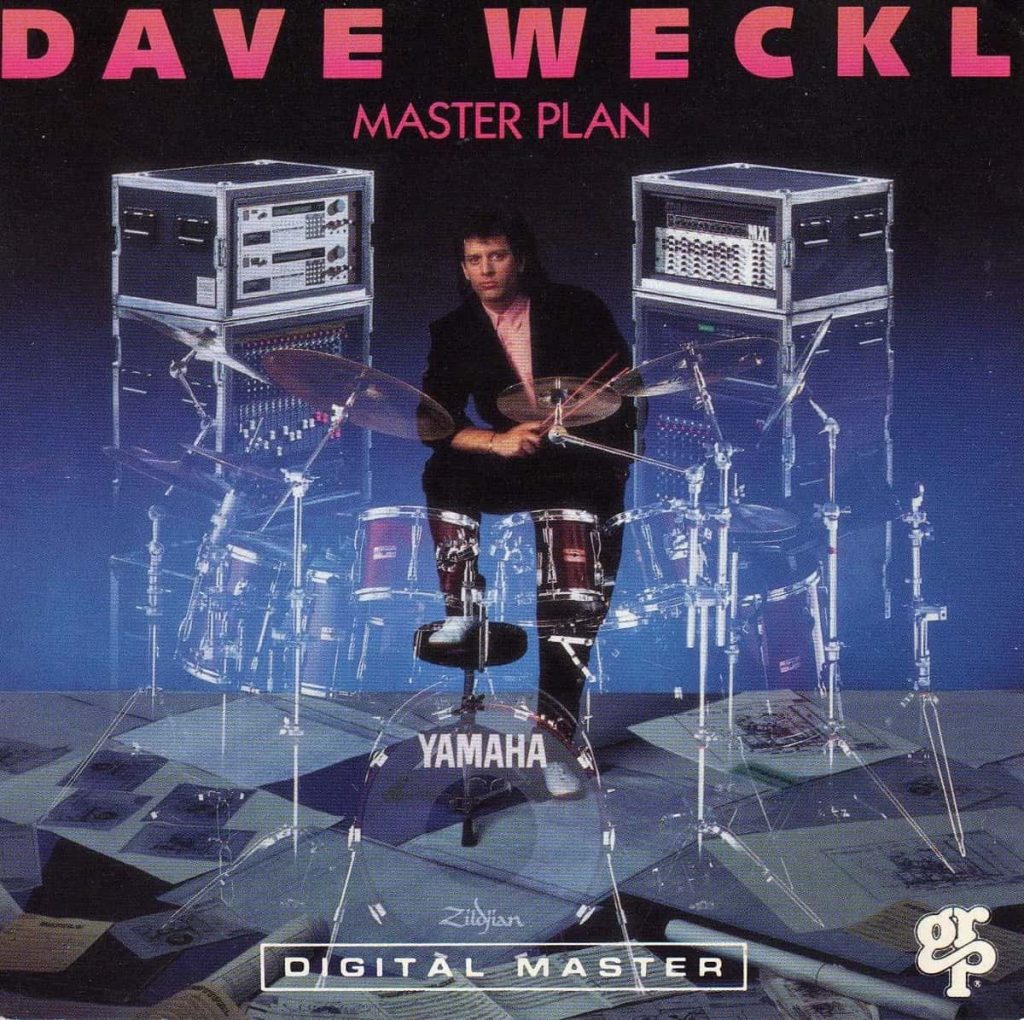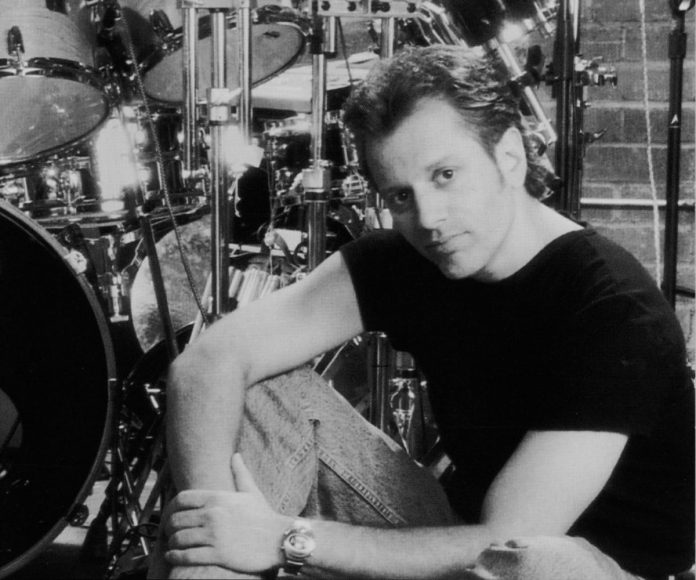By 1990, just 10 years after making his big splash on the New York club scene, drummer Dave Weckl had the world at his feet. The exposure he was enjoying with Chick Corea’s Akoustic and Elektric bands had made him one of the most respected and in-demand players in jazz. He was also first call on the US studio scene, recording albums with artists such as Diana Ross, Paul Simon, Richard Tee, George Benson, Mike Stern, Nathalie Cole, Tania Maria and Madonna.
Amazingly, between all the shows and studio dates that year, Weckl also signed a recording deal with Dave Grusin and Larry Rosen’s then-hip GRP imprint and released his first solo album, Master Plan. It was a disc that displayed not only his jaw-dropping skill and diversity on drums, but also his consummate abilities as a composer, arranger and producer. The album was also, for Weckl, a kind of an audible upshot of a “master plan” he had devised in his head to make it to the top of his game, the culmination of years of solid study, hard practice, discipline and playing that paid off. Upon its release, Master Plan’s exhilarating mix of funk, Latin, pop, rock and jazz was not only a huge influence on millions of mind-blown drummers worldwide, it widened the goalposts of contemporary drumming.
Born in St. Louis, Missouri and raised on a diet of loud rock, small jazz and his dad’s more dominant big band collection, Weckl first began to make real waves on the drum scene in 1980 when he relocated, via Bridgeport, New Jersey, to New York City. It was with fusion outfit Nite Sprite (named after the Chick Corea cut) that he quickly began to forge a huge reputation, wowing audiences in Big Apple bars such as the Bottom Line and 7th Ave South and attracting the attention of some of his own musical heroes in guitarist Steve Khan, Randy and Michael Brecker and drummer Peter Erskine.
In fact, it was following a gig at one of these clubs and a period Weckl spent persistently posting demos and letters to the latter, that he managed to land his first high-profile engagement. “I can tell you that that period in my life was magical…” Weckl recalls with enthusiasm today. “From 1980 to ’81, I was working and practising very hard, Nite Sprite was playing a lot and getting lots of attention and then Peter saw me playing with that group and recommended me for the gig with French Toast. It was a band with many of New York’s top studio musicians in it including bass extraordinaire Anthony Jackson who was later responsible for recommending me for the Simon and Garfunkel reunion show and spreading my name around the New York studio scene…”
Short-lived, the Latin-infused French Toast would morph into the Michel Camilo group, and while Weckl remained in the chair for that gig, he also started working with more artists. “Man, I met so many of the great, top-level musicians in New York in that period, one being Steve Khan who was responsible for the Bill Connors hook up and the recording of the Step It album, and another being the late, great, Michael Brecker who was partially responsible for Chick (Corea) finding me in late 1984.”
‘I remember very clearly one review I got in Modern Drummer magazine, from a writer that shall remain nameless, that was very hurtful, a blistering, mean review’
Weckl remembers vividly the night he first met Chick Corea, mainly due to an embarrassing incident that ensued on stage whilst playing in front of his future boss. “I remember we (the Bill Connors Group) were playing on stage already, the club was pretty full and the stage was high; you could see a lot of the audience, including the one main aisle that went from one side of the club to the other. During a song, I saw Chick come in with his wife Gayle and walk across the club to that aisle. I don’t recall exactly what happened, but at the time I had my floor tom tom hanging off the same stand as the ride cymbal and, for whatever reason, the whole thing fell over, right into me! I recovered quickly, but it was a real moment!”
However cringeworthy that scene on stage was for Weckl, Corea enjoyed the show enough to wander backstage and headhunt the drummer. Within weeks, Bill Connors was looking for a new drummer and Weckl was in a rehearsal room with Chick Corea’s new Elektric band. Weckl admits today he was ready for the challenge. He had been practising heavily and playing high-energy music with French Toast and Michel Camilo and had spent a lot of time during his teens pouring over and playing along to Corea’s music. He’s certain this helped him understand Chick’s playing and phrasing. “When we played the first time, it was like playing to the records. It was awesome and there was pretty immediate chemistry, which (bassist) John (Patitucci) fell into as well for the same reasons!”

Whether in a “Elektric” or “Akoustic” setting, Weckl went on to tour extensively and record something like five studio albums with Corea between 1985 and 1990. Then the opportunity to record his own came knocking. “In that period, GRP were handing out record deals like candy. If you were with a high-profile gig, all the sidemen that the company thought could sell their own records got deals. I was offered a deal at the same time that John (Patitucci) and Eric (Marienthal) got theirs, but I turned it down. I felt I wanted to capture as many drum fans as possible first. I had two instructional videos in production and had another project on the table that I really wanted to finish which was my audio playalong package – Contemporary Drummer +1.”
Along with his long-term music associate, keyboardist Jay Oliver, Weckl had produced the said package almost as a demo or precursor to Master Plan, so when GRP offered it again the next year, as part of the drummer’s “master plan”, Weckl took it. The label had given him free rein to make the record he wanted to make but Weckl remembers the creative process being a fun but stressful one, mainly due to time constrictions and commitments to other work: “Jay was my partner in crime in all this, and we basically locked ourselves in his parent’s basement studio in St Louis for a month or so and just wrote music together. We actually took a couple songs from the playalong package and re-recorded them with Mike Brecker, Chick and Anthony Jackson on bass. Besides that, it was just us in writing mode, the ideas just came together.
“A few of the songs, like Garden Wall and Common Ground (composed by Jim and Peter Mayer and Roger Guth) along with Island Magic and Auratune were existing already – we just had to arrange them. I was under contract to deliver the record to GRP, and due to my touring schedule with Chick, there wasn’t a lot of time off to do it. Of course, the writing took intense, concentrated time, as did the recording and mixing. Then there was the organisation of bringing in other players, like Mike Brecker and Anthony Jackson, from New York, Chick from LA, then all of us flying out to LA to record the title track. Anthony almost didn’t make it, as American Airlines was not gonna let him on the plane with his bass. Luckily we talked the pilot into it!”

On the subject of key tracks, Weckl says the blistering, funky opener Tower Of Inspiration probably has the most interesting story behind it. “We were in the middle of the writing phase. It was late at night, and we took a break to watch The Johnny Carson Show because we got word that this young drummer, Jacob Armen, was going to play Spain. It was so inspiring to watch this young guy playing so well, that I was immediately inspired to write something. I started hearing the groove, bass line, and even some of the melodies so I quickly grabbed a piece of paper and started writing things down, the rhythm ideas and stuff. That tune came together pretty quickly, as did the title! I’ve told Jacob that story many times, but, thanks again Jacob!”
Equally energetic, the timbale and synth-heavy Island Magic had been written earlier (for the Contemporary Drummer + 1 package, and was inspired by Weckl’s passion for Latin music. “I wanted to make it a bit different by playing a songo type groove in 7/8 so that song became a mix of 7/8 funk fusion and a songo in seven! My love for big bands always helps to inspire some of those elements included in my writing and that song was no exception. We slightly rearranged it, and got Anthony and Chick to play on this record version.” Festival De Ritmo was another offering in a Latin vibe with a striking horn arrangement blown over sections of complex rhythms.
The powerful title track was maybe most notable though for the fact it was written (at the request of Weckl) by Chick Corea essentially as a drum feature/duet between our man and the great Steve Gadd. “The whole idea for me was to try to recreate a session with the guys that I grew up listening to, and put myself and Jay in the middle of it. I’m referring to the Mad Hatter and Leprechaun recordings, where I first heard Steve play, some 15 years earlier. It was even recorded at the same studio (Mad Hatter studios in Los Angeles), so it was a pretty special idea. The song was rehearsed and recorded live, all in one day. Steve is one of the most influential drummers of all time, and yes, one of my main influences, not to mention a great guy. It was super cool and special that he agreed to do this with me.”
Weckl recalls that once released Master Plan received mixed reviews: “The fans loved it, the purists, not so much. I remember very clearly one review I got in Modern Drummer magazine, from a writer that shall remain nameless, that was very hurtful, a blistering, mean review, I mean that guy really didn’t like it!” Indeed, listening back to the disc prior to this interview, Weckl found his feelings were as mixed as the reviews were. He was quick to criticise the overly dominant sound of a cheap old snare drum that he rescued from a neighbour’s attic and used on most of the record, and how he would love the opportunity of remixing the record in general.
“Playing wise, I think we all tend to cringe a bit when we hear ourselves on old records. I think the playing from everyone was great, but for me, I know that I would approach things differently now. Things like (the straightahead jazzer) Softly As In A Morning Sunrise, even though I used an 18” bass drum, the drum set still sounded very fusiony. These days I like to try to be a bit more ‘authentic appropriate’ for tracks like that.
“In general though, it brings back memories of a wonderful time writing, creating, performing, recording and mixing this project with friends, great people and great musicians. Lots of love went into this project.”
















